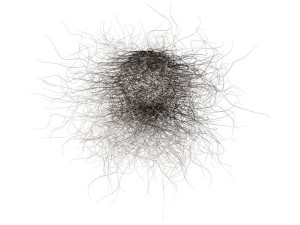
What is Telogen Effluvium?
Telogen Effluvium is a type of non-scarring hair loss. It is also called “Resting Phase Hair Loss”. Normally, most persons have 90% of the hairs on their head in the Anagen or “growing” phase. That stands to mean that ~10% are in Telogen, the “resting” phase. This is the phase that the hair goes into before it is shed. The new hair that will replace it grows upwards, pushing the hair out allowing for easy extraction when combing, brushing or washing your hair. The shed hair would of course have the white tip at the root.
How does Telogen Effluvium present?
Telogen Effluvium usually starts 3-4 months after the incident that triggers it. It can be Acute or Chronic. Acute cases usually last 6 months. Anything longer than that indicates some chronicity and usually hints at a persistent problem triggering the hair loss.
In general, most persons lose 50-100 hairs per day, but in Telogen Effluvium, the numbers can rise significantly. This excessive shedding is what alarms persons, as they feel that they cannot control the amount of hair that is lost. Persons usually complain of a significant amount of hair being lost when they wash their hair. Some notice their hair showing up in random places like the floor, car seat, clothes, pillow etc. Or others may notice that when they do comb their hair, an insane amount seems to come out.

Though it causes diffuse thinning all over the scalp, persons may notice that certain areas seem thinner. Women may notice that their hair seems thinned out especially the temples, top or crown of their scalp. Their pony tail seems thinner or their “buns” are smaller than usual. Men often notice thinning in the temples.
What causes Telogen Effluvium?
There are several causes of Telogen Effluvium:
- Significant stressful life events: death, divorce, bankruptcy/debt.
- Rapid weight loss
- Medication- both vitamins (high amounts of Vitamin A), drugs e.g. certain anti-hypertensives, anaesthetics etc.
- Major surgery
- Anaemia- mainly Iron deficiency
- Poor diet- anorexia nervosa, fad diets, malnutrition
- Significant illness – e.g. chronic diarrhoea
- Post pregnancy
So how do you treat Telogen Effluvium?
Most persons experiencing Telogen Effluvium will notice that it will spontaneously resolve. However, those who have Chronic Telogen Effluvium, will need to be investigated to find out the exact cause, and have that cause corrected. Additionally, certain products like Minoxidil (Rogaine) will help the hairs to stay in the anagen stage longer, thus prolonging the hair on the head and decrease shedding over time. Once the Telogen Effluvium is resolved, the individual will not need to continue using the Minoxidil.
Well written, useful info. My patients do complain of this problem. I will refer to ATHD!!!!!